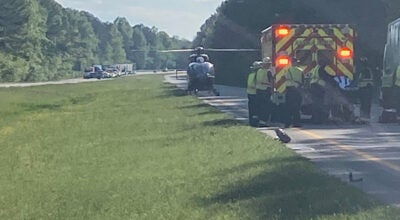‘Be very careful’
Published 10:20 pm Monday, December 16, 2013
Police often must intervene in mental health situations
Editor’s note: This is the second in a series of stories on the crisis of mental health treatment for juveniles in Western Tidewater.
Lauren Samuels (not her real name) has been attacked multiple times by her 14-year-old son at their Suffolk home, and yet he’s never been charged with a crime.
She has been charged, though, when she has tried to defend herself against his 6-foot-4-inch, 270-pound frame.
When a family is in a mental health crisis, police are often the first responders. With little more than a moment’s notice, they step into a volatile situation for which their training can’t always prepare them.
One option available to a family in crisis is obtaining an emergency custody order, a process that police often facilitate. The order, issued by a magistrate upon evidence presented by a parent, physician or, in the absence of a parent, another responsible adult, is designed to hold the juvenile until an evaluation can be conducted and, if deemed necessary, a treatment facility can be found for them.
But the order is good for only four hours, with one two-hour extension possible. The person is released if the order cannot be executed within that six-hour window.
The orders, and extensions to them, are not uncommon, and the number issued in Suffolk is increasing. In Fiscal Year 2013, 242 emergency custody orders were issued in Suffolk, and 80 of them were extended for two hours. Nineteen of them were for juveniles.
Except for the juvenile number, which fell from 20, those figures had grown from Fiscal Year 2012, which saw 236 issued and 49 extended. Those numbers, likewise, were increases from the year before that.
Brian Dolan, the chief magistrate in Suffolk, said he has personal experience with extending the orders to provide more time for an evaluation and treatment to be located.
Sometimes, a mental health issue manifests itself in domestic violence. Juveniles can lash out at their parents, as with Samuels’ son.
In cases of domestic violence, Virginia State Code dictates an arrest be made where a predominant aggressor can be determined and when that person is an adult. But it’s not so cut-and-dry when a juvenile is the aggressor.
“Officers are left with trying to determine who the primary aggressor is,” Detective Joyce Williams said, noting the incidents rarely have witnesses, much less unbiased ones. “You have to rely on what they say. It would be nice to think that in the real world, everybody is truthful with us.”
Officers are trained to “go in with your eyes open” and avoid making assumptions based on gender and size, among other things, Williams said. “Sometimes people have preconceived notions, and you have to be very careful.”
If the primary aggressor is determined to be a juvenile, things get complicated. A juvenile can be arrested on the spot only for more serious crimes, so the process begins with the officer contacting juvenile court services on the next business day.
A juvenile probable cause form is filed, and an intake officer determines whether a petition should be issued for the juvenile.
“Very rarely will they issue a petition,” Detective Drake Vaughan said. “The judge makes the final determination.”
The long, behind-the-scenes process can lead to the perception that nothing gets done when a juvenile is involved, Williams and Vaughan acknowledged.
Child Protective Services also is contacted any time a child is involved in a domestic violence incident, Williams said, even if he or she was merely present in the home when it occurred. That’s a Suffolk Police Department policy.
An intake officer can also send the child to a diversion program — but, to be eligible for that option, the child has to admit he did something wrong. Parents are also expected to cooperate in the program, and the child has to complete the program.
“If they don’t do it, an option is to bring the original charge right back,” Vaughan said.
Williams said a number of programs, both court-related and not, are available. The National Guard’s Commonwealth ChalleNGe, the Western Tidewater Regional Jail’s Straight Talk program, the Up Center’s mentoring program, the Suffolk Police and Fire departments’ Youth Public Safety Academy, and many more are available to help steer adolescents on the correct path.
Williams said it’s possible some parents don’t know about all the options available to them.
“How does the parent know this until somebody takes the time to tell them?” she said.
Coming Wednesday: How mental health treatment for juveniles in Virginia is difficult to access.






